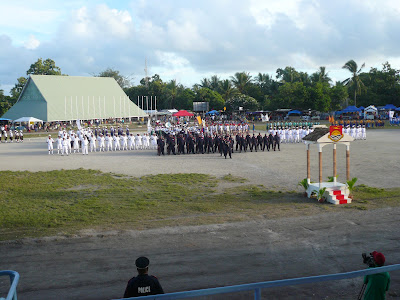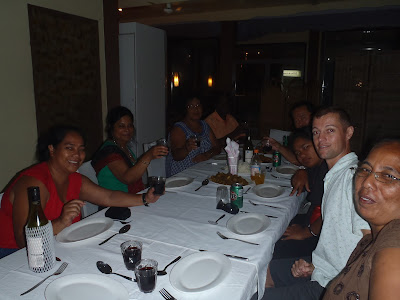The enchanting melody funneled through the cabin of the powerful jet as we entered Fiji’s airspace. It carried the sounds of the waves, flavor of the salty-sandy beaches, vibrancy of eternal-summers, vibrations of the volcanic mountains sleeping in the womb of the deep, cold, Pacific Ocean. I was charmed.
I had never before worked in the south Pacific region. After a 2-day transit in Fiji I was slated to head towards the tiny island of Tarawa––the capital of Kiribati. Kiribati consists of 32 Atolls and one raised coral island, and occupies a large marine-space. Only 20 of these tiny islands are inhabited.
. . . I was back in D.C. after my stint in Herat. Days rolled on to months. I rested––did a couple of interviews as scheduled by the NYHQ. They went well. After years in Afghanistan, I wasn’t mentally ready for the dep-rep post in North Korea . . . the first time Rep in an East African country office was unsure about me as his first-time dep-rep. So that fell through . . . In a way, I wasn’t unhappy. I wanted to quit.
Anyway, the top management’s priority was to place me . . .
The HR officer dealing with me, had alerted about the post in Kiribati––a far, far away land. I googled. It seemed like an escape from the maddening crowds––our myopic, stagnant survival. I agreed to speak with the representative from UNICEF-Fiji. UNICEF-Kiribati reported to Fiji.
I was in the shower when my blackberry rang. (I still had my roaming device and laptop issued from UNICEF-Afghanistan).
I sat in the bath tub almost an hour for a long conversation with the Representative––Dr Ndombi. The tiny office had little money he honestly informed. He was well aware about my situation––evacuation from Herat, and my work-background. He mentioned he had met me years ago while I was in ESARO, and co-facilitated a communication strategy development workshop in Tanzania where he was based. Small world!
He said something like:
“There are many challenges in Kiribati that would excite you.” He elaborated on the ongoing activities and the adolescent girls’ initiative project that was in the pipeline––waiting to be initiated . . . His words touched all the valves in my heart. I agreed to a reconnaissance visit to the remote island country.
“What if I refuse the offer?” I asked.
“You can. Fiji office will bear all travel costs. I want you to physically be there––before you make up your mind.” Wisdom, tact and kindness are the words I reserved for Dr Ndombi. And that worked!
My plane landed at Nadi. The flight was so delayed that I missed my connection to Suva––about a 30 minutes flying time. It was a Sunday. I called the Rep––he was my only contact. He advised me to cross the road and check into the airport hotel (the only one near the airport) and assured that the admin staff would arrange my flight early morning of the next day.
The ocean-aroma, warmth and vibrancy of Fiji embraced me. I drifted off to sleep. After 2 days in Suva, I flew to Tarawa––in the middle of nowhere, 1500 KM from Fiji.
I held my breath as the Boeing began descending. All I saw were the foaming waves and the deep turquoise of waters surrounding a shockingly razor-thin strip of land rising out of the ocean-bed. We landed on the very short tarmac without falling into the ocean (!!).
“I’m staying!” My choice was clear. The soft breeze carrying the subtle incense of frangipani and hibiscus followed me.
I met with the office staff, was introduced to key people in the government by Kang, who I was meant to replace.
In the evening, I walked around. The independence week festivities were on going. I was invited to attend the main celebration the next day, to be inaugurated by the president, His Excellency Anote Tong.
The only road circled around the narrow island buried amongst coconut palms, cradled by tons and tons of water.
“Avoid walking under coconut trees as head injury from falling coconuts is a grave threat. No parking near them” ––was my first security briefing. Coconut is central to the Kiribati-culture. The main internet service was called Coconut wireless/wifi.
On my way back to my tiny motel-lodge, I met two giggling girls going home with a freshly caught tuna. They were my first educators.
“We love singing, dancing. It’s our culture,” they said. Their English was good. We talked about many things amidst episodes of giggles. I loved giggling with them.
“We want our parents to talk to us more. They don’t know what we think, what we do . . . some nights we get out of our huts.”
“Really? Only you two?” I asked.
“No, there are other kids. We swim . . . drink beer . . .” I learned a lot, and the beautiful local words:
Te mauri, teroi, tetaboema (health, peace, prosperity).
Note: I worked in Kiribati from 2011-April, 2015.
I had never before worked in the south Pacific region. After a 2-day transit in Fiji I was slated to head towards the tiny island of Tarawa––the capital of Kiribati. Kiribati consists of 32 Atolls and one raised coral island, and occupies a large marine-space. Only 20 of these tiny islands are inhabited.
. . . I was back in D.C. after my stint in Herat. Days rolled on to months. I rested––did a couple of interviews as scheduled by the NYHQ. They went well. After years in Afghanistan, I wasn’t mentally ready for the dep-rep post in North Korea . . . the first time Rep in an East African country office was unsure about me as his first-time dep-rep. So that fell through . . . In a way, I wasn’t unhappy. I wanted to quit.
Anyway, the top management’s priority was to place me . . .
The HR officer dealing with me, had alerted about the post in Kiribati––a far, far away land. I googled. It seemed like an escape from the maddening crowds––our myopic, stagnant survival. I agreed to speak with the representative from UNICEF-Fiji. UNICEF-Kiribati reported to Fiji.
I was in the shower when my blackberry rang. (I still had my roaming device and laptop issued from UNICEF-Afghanistan).
I sat in the bath tub almost an hour for a long conversation with the Representative––Dr Ndombi. The tiny office had little money he honestly informed. He was well aware about my situation––evacuation from Herat, and my work-background. He mentioned he had met me years ago while I was in ESARO, and co-facilitated a communication strategy development workshop in Tanzania where he was based. Small world!
He said something like:
“There are many challenges in Kiribati that would excite you.” He elaborated on the ongoing activities and the adolescent girls’ initiative project that was in the pipeline––waiting to be initiated . . . His words touched all the valves in my heart. I agreed to a reconnaissance visit to the remote island country.
“What if I refuse the offer?” I asked.
“You can. Fiji office will bear all travel costs. I want you to physically be there––before you make up your mind.” Wisdom, tact and kindness are the words I reserved for Dr Ndombi. And that worked!
My plane landed at Nadi. The flight was so delayed that I missed my connection to Suva––about a 30 minutes flying time. It was a Sunday. I called the Rep––he was my only contact. He advised me to cross the road and check into the airport hotel (the only one near the airport) and assured that the admin staff would arrange my flight early morning of the next day.
The ocean-aroma, warmth and vibrancy of Fiji embraced me. I drifted off to sleep. After 2 days in Suva, I flew to Tarawa––in the middle of nowhere, 1500 KM from Fiji.
I held my breath as the Boeing began descending. All I saw were the foaming waves and the deep turquoise of waters surrounding a shockingly razor-thin strip of land rising out of the ocean-bed. We landed on the very short tarmac without falling into the ocean (!!).
The only road in Tarawa
“Mauri, mauri.” Voices engulfed me. I met the most beautiful people in the most amazing land, saw the barefooted ground staff on the tarmac. (“Even some Ministers do the same. It’s Kiribati!” I was told later). “I’m staying!” My choice was clear. The soft breeze carrying the subtle incense of frangipani and hibiscus followed me.
I met with the office staff, was introduced to key people in the government by Kang, who I was meant to replace.
In the evening, I walked around. The independence week festivities were on going. I was invited to attend the main celebration the next day, to be inaugurated by the president, His Excellency Anote Tong.
The only road circled around the narrow island buried amongst coconut palms, cradled by tons and tons of water.
“Avoid walking under coconut trees as head injury from falling coconuts is a grave threat. No parking near them” ––was my first security briefing. Coconut is central to the Kiribati-culture. The main internet service was called Coconut wireless/wifi.
On my way back to my tiny motel-lodge, I met two giggling girls going home with a freshly caught tuna. They were my first educators.
“We love singing, dancing. It’s our culture,” they said. Their English was good. We talked about many things amidst episodes of giggles. I loved giggling with them.
“We want our parents to talk to us more. They don’t know what we think, what we do . . . some nights we get out of our huts.”
“Really? Only you two?” I asked.
“No, there are other kids. We swim . . . drink beer . . .” I learned a lot, and the beautiful local words:
Te mauri, teroi, tetaboema (health, peace, prosperity).
Note: I worked in Kiribati from 2011-April, 2015.







Comments
Post a Comment
If you are a member of XUNICEF, you can comment directly on a post. Or, send your comments to us at xunicef.news.views@gmail.com and we will publish them for you.